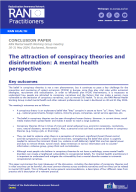Details
- Publication date
- 19 July 2024
- Author
- Directorate-General for Migration and Home Affairs
- Country
- Romania
- RAN Publications Topic
- Mental health issues
Description
The belief in conspiracy theories is not a new phenomenon, but it continues to pose a key challenge for the prevention and countering of violent extremism (P/CVE) in Europe, since they play vital roles within extremist ideologies, recruitment and radicalisation. In order to efficiently plan P/CVE interventions, it is necessary to understand how people are attracted to conspiracy narratives and the factors that can make a person more vulnerable to the attraction of conspiracy narratives, such as mental (ill) health. To do so, the RAN Mental Health Working Group invited mental health and other relevant professionals to meet in Bucharest on 30 and 31 May 2024.
The meeting’s outcomes are as follows:
- A conspiracy theory is an explanatory belief that “they” conspire in secret to harm “us”. Here, “they” are, e.g., national governments, foreign nations, minority groups, companies, secret service agencies, etc.
- The belief in conspiracy theories can be seen throughout human history. However, in current times, social media makes them spread faster and makes it easier to reach a large audience.
- Conspiracy theories thrive in times of crisis and social upheaval (e.g. economic recessions, revolutions, wars, natural disasters, terrorist attacks). Also, a personal crisis can lead a person to believe in conspiracy theories (e.g. losing a job, or divorcing).
- They can lead to violence when there is a perception of imminent, significant threat (threat control override symptoms) to oneself or close environment, strengthening the belief that action is urgently needed to remove the imminent threat (i.e. violence is self-defence); belief that one has special power and duty to remove threat; tunnel vision: deep immersion in narrow information and no counterinformation; cohesive group, group think and normalisation.
- Although most people who believe in conspiracy theories do not have a pathology, some mental health disorders can create a heightened vulnerability to conspiratorial beliefs. For (mental health) practitioners it is important to understand and mitigate the vulnerability that a mental disorder creates to extremist conspiratorial narratives.
This paper summarises the main takeaways of the discussion, including the description of conspiracy theories and in what way they can be harmful, the most common themes across extremist narratives and how they can be related to mental (ill) health. This is followed by some general recommendations, a description of four different cases from practice and a description of a relevant practice.

